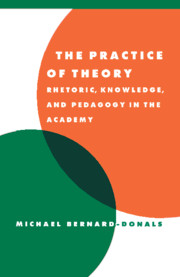Book contents
- Frontmatter
- Contents
- Acknowledgments
- Introduction
- 1 Reconsidering Gorgias, Phaedrus, and Platonic rhetoric
- 2 Why Aristotle's notion of rhetoric and science is important for contemporary critical practice
- 3 A (rhetorical) reading of the human sciences: toward antifoundationalism
- 4 Rorty and the mirror of nature: hermeneutics and the possibility of social change
- 5 Louise Phelps and Theory: toward a human science disciplined by practical wisdom
- 6 Liberatory pedagogy, conceptual knowledge: toward a practical wisdom disciplined by scientific observation
- 7 Toward a materialist rhetoric: writing the conditions of the incommensurable
- Works cited
- Index
2 - Why Aristotle's notion of rhetoric and science is important for contemporary critical practice
Published online by Cambridge University Press: 04 August 2010
- Frontmatter
- Contents
- Acknowledgments
- Introduction
- 1 Reconsidering Gorgias, Phaedrus, and Platonic rhetoric
- 2 Why Aristotle's notion of rhetoric and science is important for contemporary critical practice
- 3 A (rhetorical) reading of the human sciences: toward antifoundationalism
- 4 Rorty and the mirror of nature: hermeneutics and the possibility of social change
- 5 Louise Phelps and Theory: toward a human science disciplined by practical wisdom
- 6 Liberatory pedagogy, conceptual knowledge: toward a practical wisdom disciplined by scientific observation
- 7 Toward a materialist rhetoric: writing the conditions of the incommensurable
- Works cited
- Index
Summary
With what has been called the “rhetorical turn” or the antifoundational paradigm, work in the human sciences – by the likes of philosophers such as Rorty and Davidson, of scientists such as Kuhn and Polyani, and of philosophers of science such as Feyerabend – theorists have begun to understand that the search for foundational knowledge either by philosophical or by scientific means is a project bound to fail. In the last ten to fifteen years in particular, people such as Louise Phelps in composition studies and Richard Bernstein – in the name of Hans Georg Gadamer – have looked for a “third way” between (in Bernstein's terms) objectivism and relativism, or between the scylla of foundationalism and the charybdis of knowledge without any foundations. And because this turn has been precisely rhetorical, much attention has lately been paid to classical rhetorical texts, like the Rhetoric, Plato's dialogues on oratory (Phaedrus, Gorgias), and texts on ethics and politics, in order to determine whether that “third way” might not have been hinted at by these earlier thinkers.
This chapter will not join that fray, since the connections between rhetoric and other ways of knowing are already well established. My task here will be instead to suggest that important passages in two of Aristotle's texts on rhetoric – Nichomachean Ethics and Rhetoric – imply that in order to persuade members of the polis to pursue a particular course of action, the rhetor is bound to use the methodology of the sciences, because it is through observation that you bear out the results of rhetorical knowledge.
- Type
- Chapter
- Information
- The Practice of TheoryRhetoric, Knowledge, and Pedagogy in the Academy, pp. 38 - 59Publisher: Cambridge University PressPrint publication year: 1998



